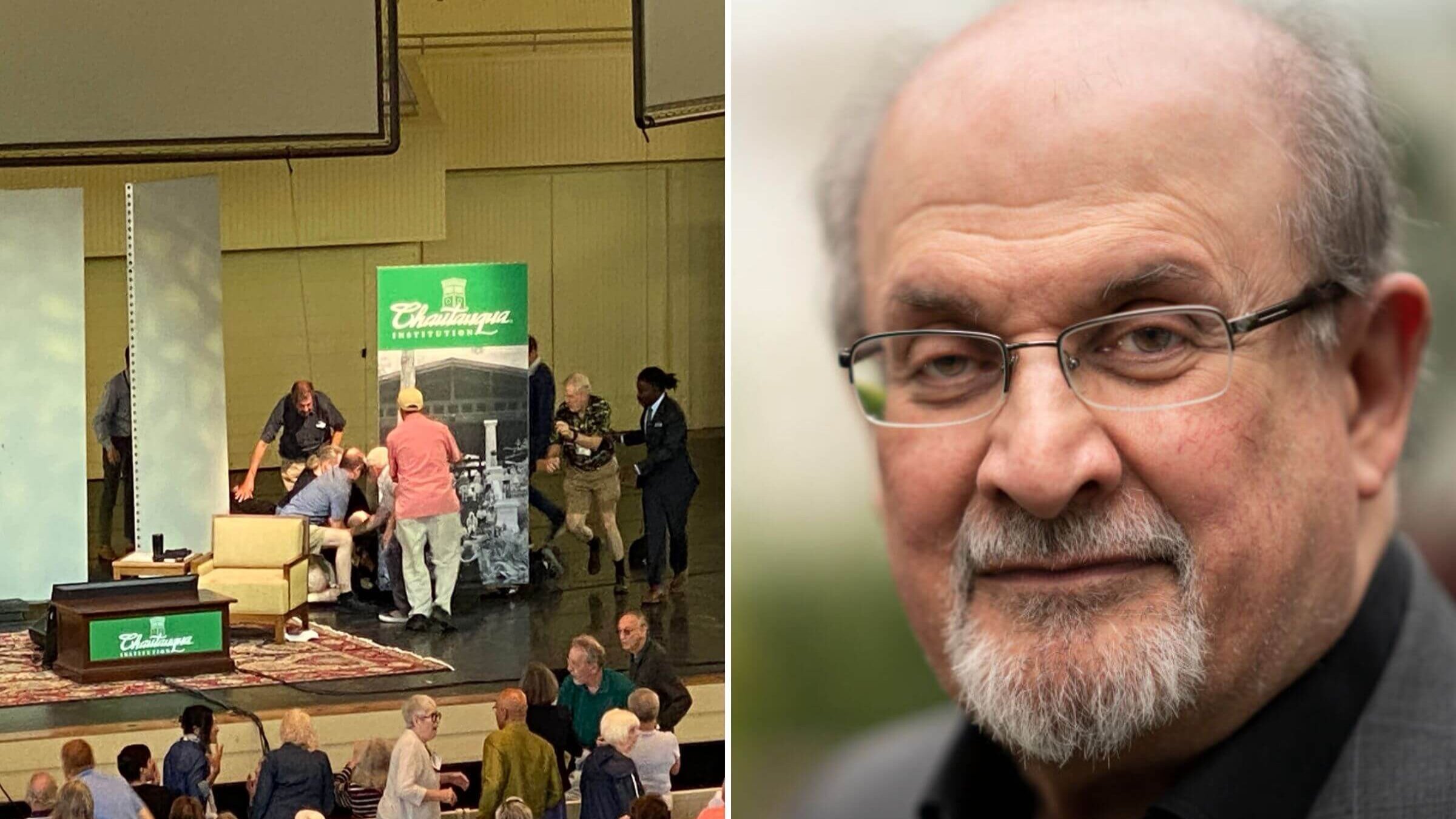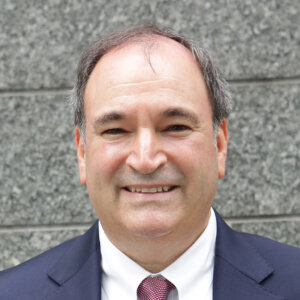I’m a rabbi who witnessed the attack on Salman Rushdie in Chautauqua. Here is how we can combat this type of hate
The brutal assault on the famed author in Chautauqua is a potent reminder of the power of civics education

On Aug. 12, celebrated author Salman Rushdie was stabbed at an event at the Chautauqua Institution. Photo by Charles Savenor & David Levenson/Getty Images Leven
When my wife and I first planned our trip upstate, a conversation between Salman Rushdie and Henry Reese at the Chautauqua Institution stood out to us as a programmatic highlight we did not want to miss. The two men would be discussing how America can support and protect political writers and creative expression. Considering Rushdie’s harrowing experience of being singled out as a target of a fatwa by Iran after the publication of “The Satanic Verses” over 30 years ago, we were eager to hear his thoughts about how best to ensure free speech today.
Our experience tragically morphed into something unexpected and surreal shortly after Rushdie and the moderator took their seats to great applause. A man jumped on the stage and began pummeling Rushdie. From where I sat 75 feet away, I could not see that the assailant was wielding a knife, only his arm going up and down repeatedly, thereby silencing the main speaker and all those in attendance.
#SalmanRushdie just attacked onstage at @chq @NBCNews @ABC @cnnbrk pic.twitter.com/I1XT6AmkhK
— Charles Savenor (@CharlieSavenor) August 12, 2022
“This never happens at the Institution,” people said aloud as much to themselves as those around them, as we collectively tried to make sense of what transpired.
Later that day we walked over to the amphitheater, where a pile of flowers, placards of hope and a candle adorned the entrance that had been closed since the attack. Watching the maintenance team scrub blood off the stage, I gasped at the realization that this violent attack had transformed this platform for inspiration and wisdom into a crime scene.
I attended this event not just for my own edification but also because it connects to my work at Civic Spirit, an organization that promotes and provides training in civic education to faith-based schools — Jewish, Catholic, Christian, and Islamic — with 4.5 million students nationwide. In our three-pronged approach, we cultivate civic belonging, democratic fluency and civic skills at a time when our country needs bridge building, understanding and trust more than ever.
While scrubbing away the blood and forming a prayer circle allowed Chautauqua Institution to reopen its cherished communal space, the most effective way to reclaim civility, community and shared responsibility in America is through education. More than planting seeds that will blossom in the future, civic education prepares young adults to become knowledgeable participants and stakeholders in this great democratic republic.
With rising distrust in government and a growing sense of helplessness in young people, civic education constitutes a constructive path forward. Unlike their public counterparts, day schools are not required to include civic education. At this polarized moment, it is vital that we not only ensure that our day schools focus on civics but also that teachers and administrators are supported in this endeavor at their parent’s kitchen table and spiritual leaders’ pulpits.
On Aug. 12, over 2,000 people at Chautauqua expected to learn how our society can encourage and support open dialogue and foster understanding across divides. Sadly what we witnessed was a brutal violation of the fundamental values of the Institution and America itself.
On a trip to Chautauqua over a hundred years ago, President Teddy Roosevelt asserted that Chautauqua Institution and its educational approach to dialogue and exploration represent “America at its best.” The attack on Salman Rushdie at Chautauqua reminds us of the great and worthy efforts incumbent on each generation to actualize this aspiration again and again.
To contact the author, email [email protected].
The Forward is free to read, but it isn’t free to produce

I hope you appreciated this article. Before you go, I’d like to ask you to please support the Forward.
Now more than ever, American Jews need independent news they can trust, with reporting driven by truth, not ideology. We serve you, not any ideological agenda.
At a time when other newsrooms are closing or cutting back, the Forward has removed its paywall and invested additional resources to report on the ground from Israel and around the U.S. on the impact of the war, rising antisemitism and polarized discourse.
This is a great time to support independent Jewish journalism you rely on. Make a gift today!
— Rachel Fishman Feddersen, Publisher and CEO
Support our mission to tell the Jewish story fully and fairly.
Most Popular
- 1

Fast Forward Ye debuts ‘Heil Hitler’ music video that includes a sample of a Hitler speech
- 2

Opinion It looks like Israel totally underestimated Trump
- 3

Culture Cardinals are Catholic, not Jewish — so why do they all wear yarmulkes?
- 4

Fast Forward Student suspended for ‘F— the Jews’ video defends himself on antisemitic podcast
In Case You Missed It
-

Culture How one Jewish woman fought the Nazis — and helped found a new Italian republic
-

Opinion It looks like Israel totally underestimated Trump
-

Fast Forward Betar ‘almost exclusively triggered’ former student’s detention, judge says
-

Fast Forward ‘Honey, he’s had enough of you’: Trump’s Middle East moves increasingly appear to sideline Israel
-
Shop the Forward Store
100% of profits support our journalism
Republish This Story
Please read before republishing
We’re happy to make this story available to republish for free, unless it originated with JTA, Haaretz or another publication (as indicated on the article) and as long as you follow our guidelines.
You must comply with the following:
- Credit the Forward
- Retain our pixel
- Preserve our canonical link in Google search
- Add a noindex tag in Google search
See our full guidelines for more information, and this guide for detail about canonical URLs.
To republish, copy the HTML by clicking on the yellow button to the right; it includes our tracking pixel, all paragraph styles and hyperlinks, the author byline and credit to the Forward. It does not include images; to avoid copyright violations, you must add them manually, following our guidelines. Please email us at [email protected], subject line “republish,” with any questions or to let us know what stories you’re picking up.















